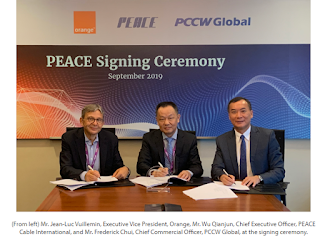PEACE Cable International Network Co. announced the final slicing of the Pakistan-Egypt segment of its subsea cable system, thus enabling ready-for-service connectivity from Karachi, Pakistan to Marseille, France.
The PEACE Pakistan-Egypt segment connects Karachi, Pakistan and Zafarana, Egypt, spanning a total length of 5,800 km. The landings of Karachi and Zafarana were completed in March and December 2021 respectively. In addition, the Mediterranean segment of PEACE linking Marseille, France, to Abu Talat, Egypt, a 3,200km long project, has also achieved RFS in March 2022.
In 2019, the landing agreement was signed by Cybernet and PEACE Cable. Cybernet, the landing partner of PEACE in Pakistan, has built the country’s state-of-the-art, Cable Landing Station in Karachi, which will allow global carriers, Content Delivery Networks (CDNs), content providers and virtually all IT-enabled firms to tap into the submarine cable capacity at easily accessible interconnect points across Pakistan. Cybernet has the most robust fiber optic network across the country which will also facilitate access and boost business opportunities for PEACE in the Asian region.
The PEACE Cable System, connects Asia, Africa and Europe, with its stronghold connecting Pakistan, France, Egypt, Kenya. The whole system deploys a state-of-the-art “system-within-a-system” and adopts advanced ROADM powered by WSS and Flexible Grid, providing PoP to PoP solutions.
PEACE has a capacity of up to 96T for Pakistan - Egypt segment and 192T in the Mediterranean segment from Egypt connecting to France. Meanwhile, PEACE is now under construction for the Singapore extension, which will extend the coverage of the PEACE cable system to Southeast Asia and continue to enhance the value of the PEACE cable system's network resources, forming a major Asia-Europe interconnection channel by connecting Singapore, the southeast Asian international circuit transfer center, and France, the European transfer center.
"The segment from Pakistan to France has now been built well, which is really a thrilling milestone”, Sun Xiaohua, COO of PEACE Cable, says. “With Cybernet, we will bring much-needed redundancy to Pakistan's Internet backbone and provide users with high-speed traffic to meet the rapidly growing demand for internet access in different types of digital scenarios in Pakistan.” Mr. Shoaib Qureshi, Country Manager of PEACE Cable in Pakistan, says: “PEACE is the first international submarine cable starting from Pakistan and reaching Europe, Africa and Singapore. It is a new beginning of submarine chapter for Pakistan market, we are very excited to grow this region’s connectivity.”
http://www.peacecable.net/News/Detail/16641
Orange and PCCW join PEACE subsea cable project
PCCW Global, Orange, and PEACE Cable International, a leading international submarine cable operator, reached agreement to deploy the Pakistan and East Africa Connecting Europe (PEACE) submarine cable system.
PEACE will be a 12,000km ultra-low latency cable system connecting three of the largest and most populous continents in the world - Asia, Africa and Europe. The backbone of the project will interconnect Pakistan, Djibouti, Egypt, Kenya and France, with additional planned landing points and extensions. Completion is targeted for 2021.
In terms of the cooperation, Orange will supply and operate the cable landing station in Marseille, as well as linking the system to one of the city’s major data centers - creating a connectivity gateway across Europe and on to the Americas through existing transatlantic networks.
Mr. Marc Halbfinger, Chief Executive Officer, PCCW Global, said, “Our collaboration with Orange is a critically important step towards bringing PEACE online and we trust the capabilities and vast experience of their teams in France to provide a successful and timely delivery of the European leg of the project. Orange has vast experience in submarine cable infrastructure development. So we are confident that Orange will not only successfully provide the necessary cable infrastructure in France, but also benefit from being one of the first major users of the PEACE cable to connect important and growing traffic from Africa to Europe.”
Telecom Egypt signs PEACE subsea cable
In addition, PEACE will be granted an additional fiber pair to its redundant cross Egypt routes to accommodate PEACE extensive demand to Europe with a total value of US$20 million. China-based HENGTONG OPTIC-ELECTRIC, which is a backer of PEACE, has also agreed to provide Telecom Egypt with fiber optic cables of different cores based on competitive pricing. This cabling will be used in Telecom Egypt's strategic plans for fiber deployment inside Egypt.
PEACE is a 12,000 km long cable system with landings in Pakistan, Djibouti, Egypt, Kenya and France.
Huawei Marine advances PEACE subsea cable project

The PEACE cable system will span 12,000 km and is designed for 200G, 16Tbps per fiber pair connectitivity. The ready for service date is targetted for first quarter of 2020.
The project is being developed by PEACE Cable International Network Co., Ltd, a subsidiary of China's HENGTONG Group. Huawei Marine Network is lead contractor.
Sun Xiaohua, Chief Operating Officer of PEACE Cable said, “PEACE Cable has created a new business model in the submarine cable industry that builds a bridge for these regions communications and provides connectivity opportunities to players all along the route by investing in the branches and gaining bandwidth on the trunk in a more efficient way.”















